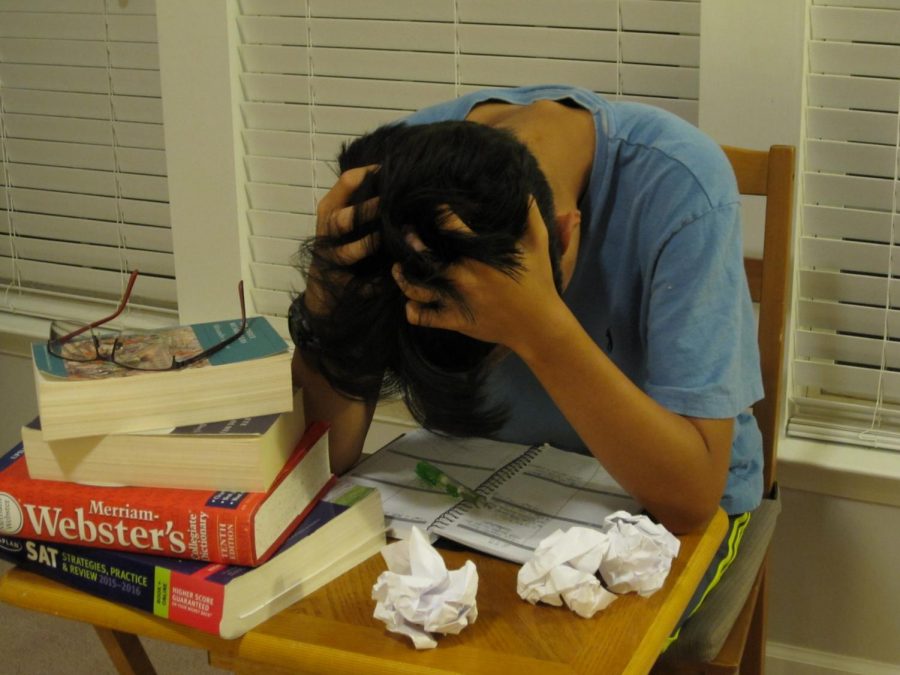The Daily Grind: Succeeding in Grades, Classes, and Extracurriculars
As final exams count as a double summative grade (and a normal summative grade if it is an EOC class), it is most important to develop the best study plan for yourself in order to pass the finals efficiently.
November 13, 2017
Once I enter the sliding doors of the stuffy, crowded school bus and manage to locate a seat, I open my agenda to take a look at my to-do list for the day. I stare at the page for today, completely filled with black scratches and scribbles. I shut the book quickly to prevent my brain from overloading on the information. All I am able do is shrug my shoulders forward in order to get an 15 minutes of precious rest to recharge myself. But my daily grind continues.
If you ask any high schooler about the main source of their stress, the answer will either be related to the amount of work they’re assigned, the limited time they have to do it, or both. Many high schoolers, both under and upperclassmen, encounter a significant work load which pertains to assignments, stretched schedules, and numerous appointments and due dates.
The common default reaction to a stressful work load is to complain. This merely leads to procrastination and distractions, which result in shoddy work. This is not a beneficial habit to develop or continue. Although no one enjoys encountering an overwhelming amount of work, every one must attempt to succeed and complete their assignments in a timely manner. Here are some tips to get into the right mindset so that the proper skills are utilized to lighten the work load:
- Stop Obsessing About It: This is actually an issue that I personally struggle with all the time. Simply ignore the magnitude of what you need to complete and focus on one particular assignment at a time. Before I do my work, I usually look over my entire agenda and consult in my head about which activities are more important. In my not-so-healthy perfectionist mindset, I think it’s necessary to memorize my agenda, so that I won’t forget to do anything. However, this clouds my memory of other important and relevant information. This leads to an ill-efficient use of time. The most useful approach is to have a physical or electronic agenda to write in, so that you don’t have to keep track of all of these tasks in your head. Most people don’t tend to use agendas, but I would highly recommend it.
- Distractions and Procrastination: Ah, the idea of wasting time. Almost every high schooler, including myself, has trouble concentrating when they are working. We want to give ourselves a break or a treat before we start working. This is not very surprising. What can be alarming is when this starts to affect one’s grades and we don’t makes any changes to improve our work ethic. Personally, when I check my grades and spot a not-so-good grade among them, I can typically justify why I did so poorly right. The reason for poor grades typically stems from procrastination or poor time management (which is something we will discuss later on). The real question is: will you, or I for that matter, do something about it?
“I disregard my work until the last second when it’s due. But, all the work I write in my agenda should be labeled as ‘HAVE to do’,” junior Brent Leib said.
- Time Management: Here is where class and extracurricular choices come into play. Many high schoolers think that at school, free time should be utilized for social media or chatting with friends. Although this is not necessarily poor judgement, it would be more productive to complete homework. A helpful tip to manage time is to use some math skills in order to decide how many hours you’re going spend on each individual task. For example, you should give yourself an hour to work or study for each subject. The small assignments like worksheets should be done in less than 30 minutes. You could give yourself more time if you have a big project due or a test to study for the next day. You could also take a short break after 30 minutes to relax your brain, but don’t take too many breaks. Otherwise, you’ll end up wasting more time. When it comes to extracurriculars, the word extracurricular actually translates into “extra work”. Extracurriculars are beneficial, but people should be wise while deciding on how to prioritize their time. As an example to prioritizing your time, if you are not doing as well as you would like in your classes, then focusing on academics full-time might be a wise choice.
“I do theater and I am part of the Boy Scouts of America, but I am able to do all my work, even if it takes all night. But, on normal occasions, I get 5 or 6 hours of sleep, and it is definitely not enough,” sophomore Jimmy Crocker said.
- Asking for help: High schoolers never seem to turn to others when they need extra support or do not understand what they are learning. While some may think it saves time and energy to not bother their teachers or classmates, the result is the opposite of what they would expect. By asking for help and guidance, you are making it easier on yourself to finish your work by understanding the material better. This may sound like common sense, but it can be surprising how many people don’t follow their own instincts to ask the teacher questions when they have legitimate and pressing concerns.
- Which path will you chose?: A good tactic for both preventing procrastination and utilizing time management is to pursue school priorities so that relaxation can be achieved without any lingering work to think about. Personally, to be able to finish my work and sleep peacefully is certainly worth sacrificing time during the day to devote to school. As you consider how to spend your time, you are ultimately left two paths to take. There is the path of hard work and satisfying leisure, or there is the path of immediate relaxation but last-minute, late-night work. Which path will you pursue?






